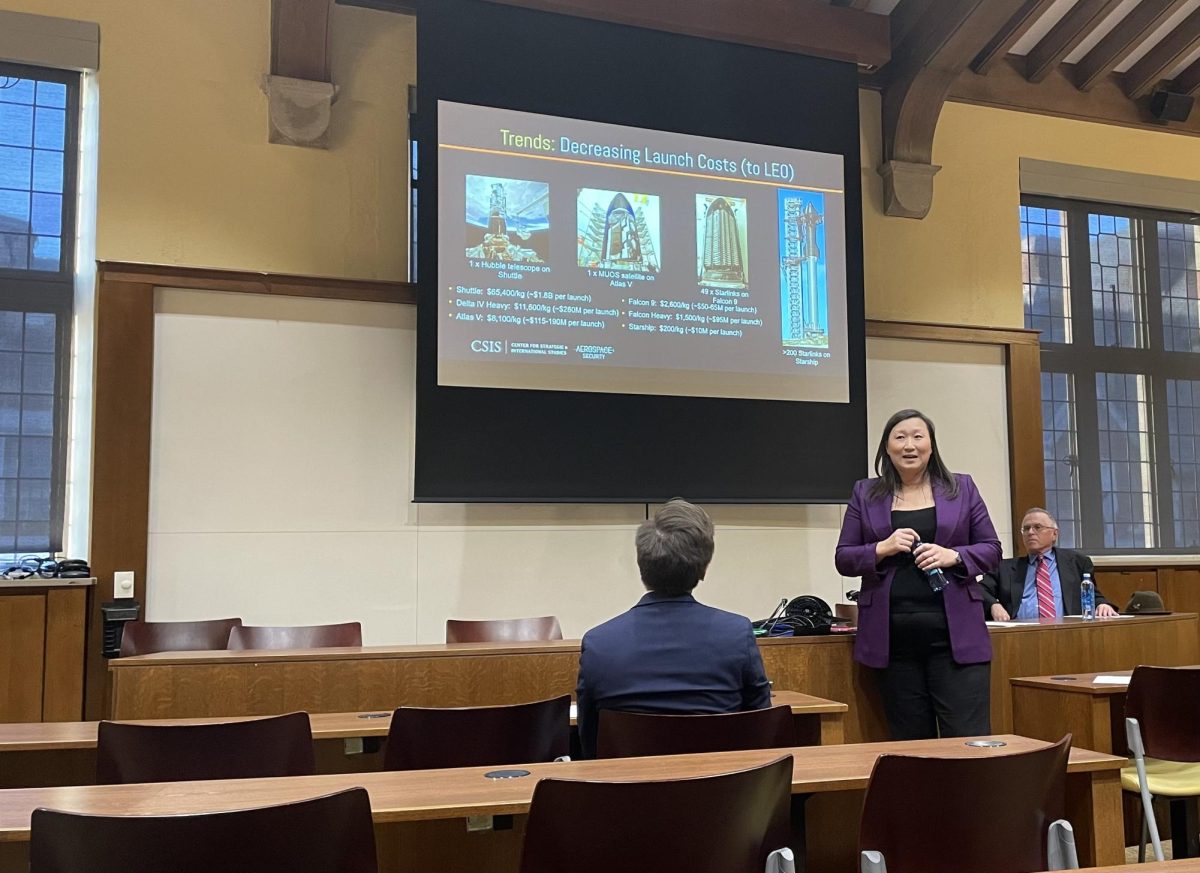Vanderbilt’s chapter of the Alexander Hamilton Society hosted an event titled “The Final Frontier: What Space Means for National Security” on March 4 in Alumni Hall. Kari Bingen spoke at the event in a discussion moderated by Ronald Schrimpf, director of the Vanderbilt Institute for Space and Defense Electronics.
Bingen is the director of the Aerospace Security Project at the Center for Strategic and International Studies and the former principal deputy under secretary of defense for intelligence. The event began with a presentation by Bingen on the state of space technology in the world of national security, which was followed by a discussion with Schrimpf and audience Q&A.
Bingen began her presentation by explaining the many ways technology in space affects the day to day lives of people on the earth.
“We use space every day and we don’t even realize it. Everything from your cell phone, navigation, communication, broadcast TV, weather forecasting — all of that relies on space,” Bingen said. “Our government uses space every day as well, from peace time through conflict. There’s a lot at stake and a lot to lose if those capabilities are threatened and targeted.”
Bingen then described recent trends in space in terms of policy and technology, including the proliferation of small satellites, decrease in cost of launch and emergence of private and commercial interests in the field.
“The decreasing cost of launch is opening up space to so many more countries, companies, universities and even individuals. Private capital is flowing into space in ways that I’ve never seen before,” Bingen said. “This is an exciting time because people in venture capital are willing to take a risk and see what can be commercialized.”
Bingen also spoke on challenges in the space industry and explained the difficulty of regulating space activity from a governmental standpoint when technology changes so rapidly.
“The policy is really not keeping pace with the technology,” Bingen said. “The licensing community is still trying to figure out how they can approve [satellite launches by] companies who are growing so fast with technology.”
According to Bingen, space holds importance for military intelligence as well as economic and commercial profits, although threats to the systems in space are growing. These threats take a number of forms, but Bingen said the most likely are cyber attacks.
The event then transitioned to a discussion between Bingen and Schrimpf. Schrimpf first explained that Vanderbilt has several satellites in orbit that were designed in partnership with amateur radio operators, with Vanderbilt researchers designing parts of the satellite that collect data on error rates of electronics operating in space.
The conversation then moved to the discussion of manned space missions and speculation on future international competition for space real estate.
“Space is an extension of what’s happening here on the ground. For the time being, I don’t see a scenario where you have a space war that’s just confined to space,” Bingen said. “Maybe years off, we could have some sort of conflict in space for lunar resources or something like that, but for the time being, any crisis or conflict in space will just be an extension of conflict on the ground.”
Schrimpf followed up by asking Bingen about the threat of anti-satellite activities, to which Bingen explained how one of the first ways Russia attacked Ukraine was by launching a cyber attack that disabled modems across Ukraine and into Eastern Europe.
“The war in Ukraine shows just how much our adversaries know we depend on space,” Bingen said. “The Russian thinking was that they wanted to separate Ukrainians’ ability to communicate, particularly with government and military forces.”
After discussing the role of the United States Space Force in protection and regulation of space activity, Bingen concluded her discussion with Schrimpf by discussing her pathway to her current career and offering advice to students in the audience.
“Everyone’s journey is different. I know this sounds trite, but you really do have to find something you’re passionate about,” Bingen said. “Far be it from me to tell you what the right path is and I will tell you that where I sit today, I would never have envisioned that I’d be here and that this is the path I would take.”
The event concluded with a few questions from the audience on topics including the possibility of nuclear weapons in space, policies for dealing with hazardous materials and satellite debris in orbit and the relationship between commercial and government interests in the space technology sector.
Student reactions
AHS President and junior Zacarias Negron said he was inspired to host this discussion on space policy and national security upon reflecting about how space’s presence in public discourse has waned compared to the time of the Space Race.
“We’re in a time of a lot of dissension and a lot of disunity even in issues of defense and foreign policy,” Negron said. “Something that can be uniquely unifying and inspiring is thinking about space, which is a place of limitless, quite literally, potential but also of endless danger if not used responsibly.”
Negron emphasized the role of the college student in fostering an interest in space and challenged students both to think about space more thoughtfully and to examine how their individual fields of study can have an impact in the realm of space.
“Whether you’re an engineering student and you like designing things, whether you’re a business student and you like thinking about new methods of distribution or entrepreneurship — all these things touch on space,” Negron said.
Negron also encouraged both students and professionals to have a grander vision of the possibilities of space.
“I fear for what the future looks like when America starts and when we as college students start becoming more and more disengaged from space and its limitless potential and endless dangers,” Negron said.
Sophomore Neal Bagai said he attended the event out of an interest in policies relating to international relations in space.
“Space by itself seems like a pretty deregulated place with everyone having their own interests, so it was interesting to know who has jurisdiction over who and how collaboration is essential but also something that might be a little lacking,” Bagai said.
Bagai also said he found the discussion of the commercialization of technology in space interesting.
“It was interesting to figure out how the defense aspect is not just limited to government agencies such as NASA but has also expanded out into the commercial sector,” Bagai said. “Now the commercial services that are up there are aiding governments or inhibiting them in some cases in achieving some sort of dominance in space.”













